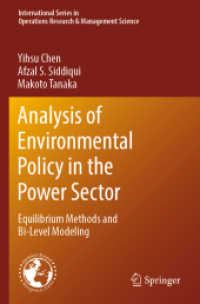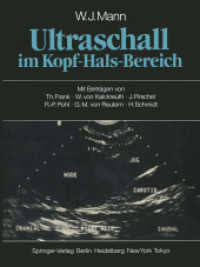- ホーム
- > 洋書
- > 英文書
- > History / World
Full Description
In this major contribution to Muslim intellectual history, Andrew Hammond offers a vital reappraisal of the role of Late Ottoman Turkish scholars in shaping modern Islamic thought. Focusing on a poet, a sheikh and his deputy, Hammond re-evaluates the lives and legacies of three key figures who chose exile in Egypt as radical secular forces seized power in republican Turkey: Mehmed Akif, Mustafa Sabri and Zahid Kevseri. Examining a period when these scholars faced the dual challenge of non-conformist trends in Islam and Western science and philosophy, Hammond argues that these men, alongside Said Nursi who remained in Turkey, were the last bearers of the Ottoman Islamic tradition. Utilising both Arabic and Turkish sources, he transcends disciplinary conventions that divide histories along ethnic, linguistic and national lines, highlighting continuities across geographies and eras. Through this lens, Hammond is able to observe the long-neglected but lasting impact that these Late Ottoman thinkers had upon Turkish and Arab Islamist ideology.
Contents
Foreword; 1. The Late Ottoman intellectual tradition: a historiographical review; 2. Ottoman exiles: from Constantinople to Cairo; 3. Ottoman scholars and their reception of Muhammed 'Abduh; 4. The Salafi revolution: Kevseri's defence of Sunni traditionalism; 5. Nation state, Islamic state: the Egypt exiles and new political imaginaries; 6. The Late Ottomans' impact on modern Islamic thought; Appendices.








